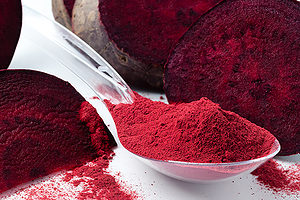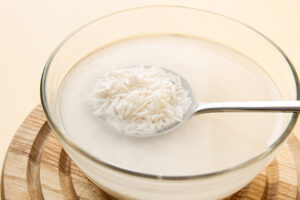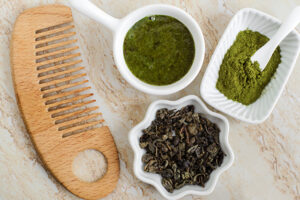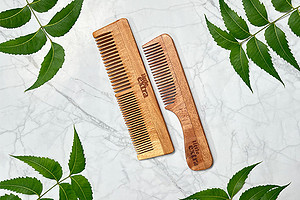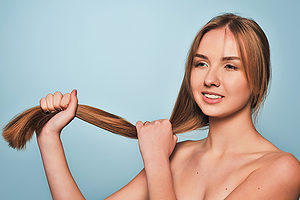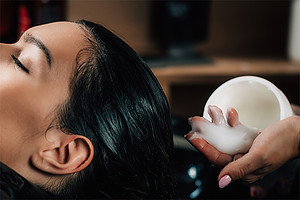Itchy and dry scalp is common in almost half of the population of any gender or ethnicity at postpubertal age. (1)
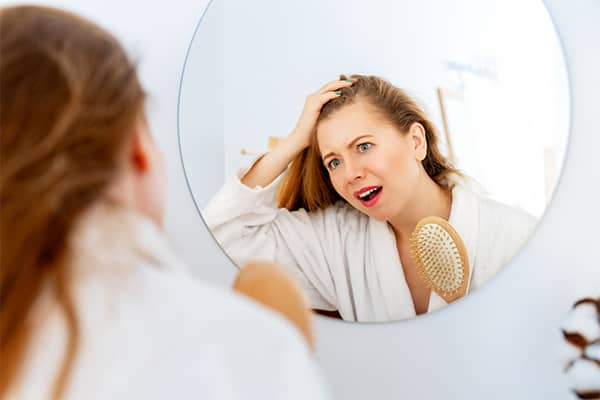
Many people must have caught themselves scratching their scalp while using conditioner.
Conditioner is usually good for the scalp. However, the wrong conditioner (or its ingredients or application) for your hair type may cause an itchy scalp.
According to experts, some conditioners make the scalp itch, but not all. This itchy sensation is temporary and goes away in a few minutes.
Also, the primary function of a conditioner is to moisturize your hair, not treat or cure any underlying scalp issues.
If you do experience an itchy scalp, switch to a different conditioner specially formulated for sensitive skin.
If you are thoroughly rinsing your hair and still experiencing rash or itchiness, you might be allergic to the conditioner. In such cases, consult your dermatologists to rule out any underlying cause of the itch.
Some conditioners reduce scalp itchiness by reducing dandruff. Continue reading to know more.
Article Contents
How Does Conditioner Cause Itchy Scalp?
An itch is a skin sensation that urges you to scratch. An itch can develop anywhere in your body, even on your scalp. Pruritus is the medical term for itchiness. (2)
There are many reasons for an itchy scalp, and knowing them can help you get the proper treatment. (3) These reasons include:
- Dry skin
- Oily skin
- Flaky skin (dandruff)
- Bumpy or raised skin
- Inflamed skin (swollen, red, and warm)
Knowing the reason behind your itchy scalp can help you eliminate the itch. (3)
However, there are times when conditioner use may lead to an itchy scalp, and it does in many ways.
1. Promotes dandruff
Dandruff is one of the most common reasons for an itchy scalp due to yeast overgrowth. This condition manifests as white to gray flakes occurring diffusely or in patches. It makes the scalp itchy and dry, with no visibility of inflammation. (4)
Regular conditioning ingredients may worsen dandruff by irritating a sensitive scalp and making the scalp oilier, providing food for the yeast.
However, dandruff can be prevented in many ways, one of which is using the right conditioner. Some conditioners fight dandruff effectively by reducing excessive dryness and flaking.
Moreover, the right ingredients (glycosaminoglycans, (5) silicon, and ceramides) from the right conditioner can aid several skin-related conditions, such as eczema, alopecia areata, and psoriasis. Some conditioners inhibit yeast infections and soothe scalp itchiness.
2. Causes scalp buildup
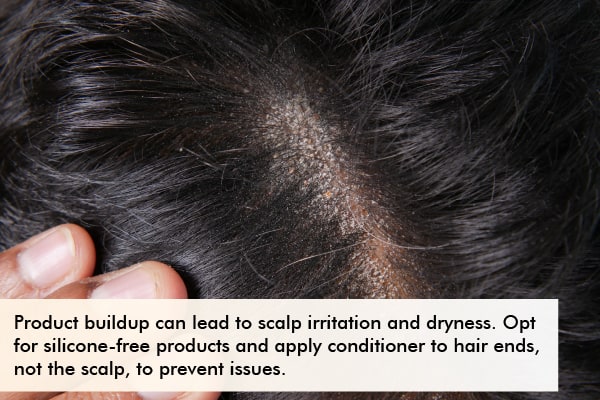
Product buildup causes scalp irritation, itchiness, and dryness. Like many hairstyling products, some conditioners contain irritants and allergens that are likely to cause a flare-up if left longer on the scalp.
Moreover, some conditioners cause scalp buildup, making the scalp itchy, dry, and flaky, interrupting the natural shedding.
Thus, stay away from harsh, silicone-containing products and conditioners.
Experts recommend using the right conditioner and only applying it to your hair lengths and tips, avoiding the scalp. (3)
3. Exposes the scalp to chemicals
Some conditioners significantly add grease to your scalp, eliminating the scalp’s natural oils and causing itchiness.
Additionally, aggressive ingredients, such as parabens and sulfates, cause itching, dryness, and irritation on the scalp, as well hair color fading, hair loss, and hair brittleness. They also increase the hair’s susceptibility to damage.
4. Disturbs scalp pH
An itchy scalp may be due to a lack of conditioning. Not applying sufficient conditioner (leave-in conditioner) thoroughly after a hair wash may lead to scalp itchiness due to a pH imbalance.
5. Causes contact dermatitis
Conditioner softens and moisturizes the hair. However, some individuals can be sensitive or allergic to a few of its ingredients (chemicals, preservatives, or fragrances). When these ingredients come in contact with the scalp, they can cause rashes, itching, or inflammation, leading to contact dermatitis. (3)
Researchers state that contact dermatitis is common and is induced by chemicals (metals or conditioner ingredients). (6)
6. Triggers sensitivity reactions
A sensitive scalp may experience unpleasant sensations such as pain, tingling, pruritus, and burning from conditioner use.
In a study, conditioner exposure was higher in the sensitive scalp group, and itch is one of its main symptoms. A sensitive scalp may be caused by prolonged contact with specific hair products. (7)
DIY Home Remedies to Say Goodbye to Itchy Scalp
Try the following remedies to bid farewell to your itchy scalp.
Walnut leaf spray
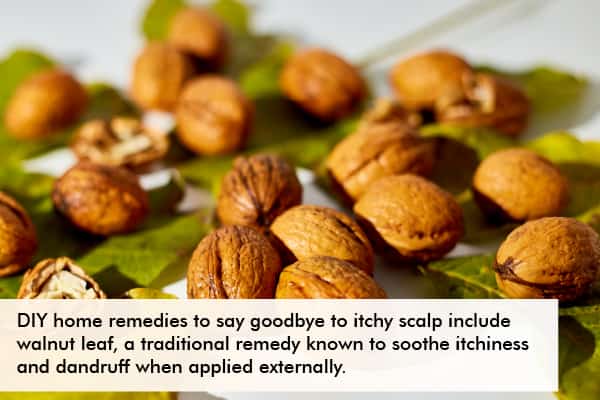
Walnut leaves are used in traditional medicine and may be a suitable itchy scalp remedy. They are helpful for external applications on itchy and dandruff-prone scalp. They act as an emollient and soothe skin itchiness disorders. (8)
How to use:
- Boil a handful of dried walnut leaves in 2 cups of water.
- Reduce the heat and let it simmer for 15-20 minutes with the lid on.
- Turn off the heat and let it cool slightly.
- Strain it using a strainer or cheesecloth. Discard the leaves.
- Transfer the liquid to a bowl or a spray bottle.
- Spray this liquid to your scalp after shampooing your hair and massage it gently.
- Let it sit for 10-15 minutes, and wash it off with cool water.
- Repeat this at least thrice a week until the scalp condition improves.
Ginger hair mask
Ginger is loaded with essential oils and minerals that condition the hair and make it more manageable. It brings about relief from dry, itchy, and dandruff-prone scalp.
Ginger keeps the scalp clean and healthy due to its antiseptic and anti-inflammatory properties. (9)
How to use:
- Slice or grate 1 inch of fresh ginger roots into pieces.
- Add this to 1 cup of water and let it boil on low heat. The color of the water will slowly change and turn translucent yellow or muddy after a few minutes.
- Turn off the flame and filter the water with a fine sieve. Press the ginger collected on the sieve to squeeze out the remaining juice.
- Let the water cool down. Mix this with a carrier oil or spray it directly onto your scalp.
- Let it sit for at least half an hour, and wash it off with a mild antidandruff shampoo.
- Repeat this process once a week to deal with an itchy and dandruff-prone scalp.
When to See a Doctor
An itchy scalp might indicate a serious condition. Consult your doctor if you experience the following:
- Soreness of the itchy spots
- Constant scalp itchiness
- Itching that affects your daily routine and keeps you up at night
- Presence of nits or lice in your hair
- No relief from over-the-counter products
Do not just rely on home remedies alone for treating itchy scalp. Consult your doctor if these symptoms persist.
General Queries
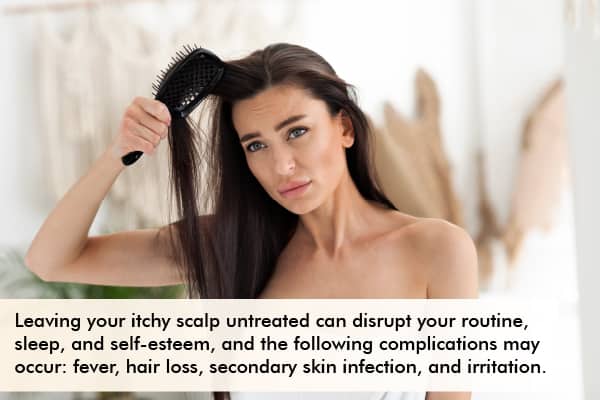
What are the complications of an itchy scalp?
If you leave your itchy scalp untreated, it can disrupt your routine, sleep, and self-esteem, and the following complications may occur:
1. Fever
2. Hair loss (alopecia)
3. Secondary skin infection
4. Irritation or rash in other body parts
How to treat an itchy scalp?
The treatment depends on the cause of the itchy scalp. These treatments include:
1. Special antidandruff shampoos
2. Moisturizing ointments and creams
3. Specific treatments such as antifungal medicine for tinea capitis, head lice treatment (combined with chemical treatments or conditioner), psoriasis medication, and corticosteroid lotions for seborrheic dermatitis.
Consult your pharmacist or doctor about the best treatment for you.
Final Word
Conditioner is a standard detangling and moisturizing hair care product. However, a few people may experience itchiness in the scalp after using a conditioner due to multiple reasons, such as fungal infection, allergic reaction, buildup, or contact dermatitis.
To treat and prevent itchy scalp due to conditioner use, thoroughly rinse your hair, use hypoallergenic or natural products, and consult your dermatologist if these symptoms persist.
An itchy scalp can be uncomfortable or annoying and may be a sign of a serious condition. Therefore, pay close attention to your scalp health and pick the conditioner suitable for your hair type.
References
- US9861645B2 – anti-itch scalp treatment compositions and combinations. Google Patents. https://patents.google.com/patent/US9861645B2/en.
- Rattanakaemakorn P, Suchonwanit P. Scalp pruritus: Review of the pathogenesis, diagnosis, and Management. BioMed Research International. January 15, 2019. https://www.hindawi.com/journals/bmri/2019/1268430/.
- 10 reasons your scalp itches and how to get relief. American Academy of Dermatology. https://www.aad.org/public/everyday-care/itchy-skin/itch-relief/relieve-scalp-itch.
- An Overview of Herbal Ingredients with Anti-dandruff Activity in Shampoo Formulations (ijrpr.com) – IJRPR. https://ijrpr.com/uploads/V4ISSUE1/IJRPR9422.pdf.
- Ordiales H;Vázquez-López F;Pevida M;Vázquez-Losada B;Vázquez F;Quirós LM;Martín C; Glycosaminoglycans are involved in the adhesion of candida albicans and Malassezia species to keratinocytes but not to dermal fibroblasts. Actas dermo-sifiliograficas. https://pubmed.ncbi.nlm.nih.gov/33609451/.
- Karger Publishers. https://karger.com/sad/article/3/1/7/291160/Common-Allergens-Identified-Based-on-Patch-Test.
- Brenaut E, Misery L, Legeas C, Roudot A-C, Ficheux A-S. Sensitive scalp: A possible association with the use of hair conditioners. Frontiers in medicine. March 15, 2021. https://www.ncbi.nlm.nih.gov/pmc/articles/PMC8005630/.
- Dawid-Pać R. Medicinal plants used in treatment of inflammatory skin diseases. Postepy dermatologii i alergologii. June 2013. https://www.ncbi.nlm.nih.gov/pmc/articles/PMC3834722/.
- The Open Dermatology Journal. https://opendermatologyjournal.com/contents/volumes/V14/TODJ-14-22/TODJ-14-22.pdf.


